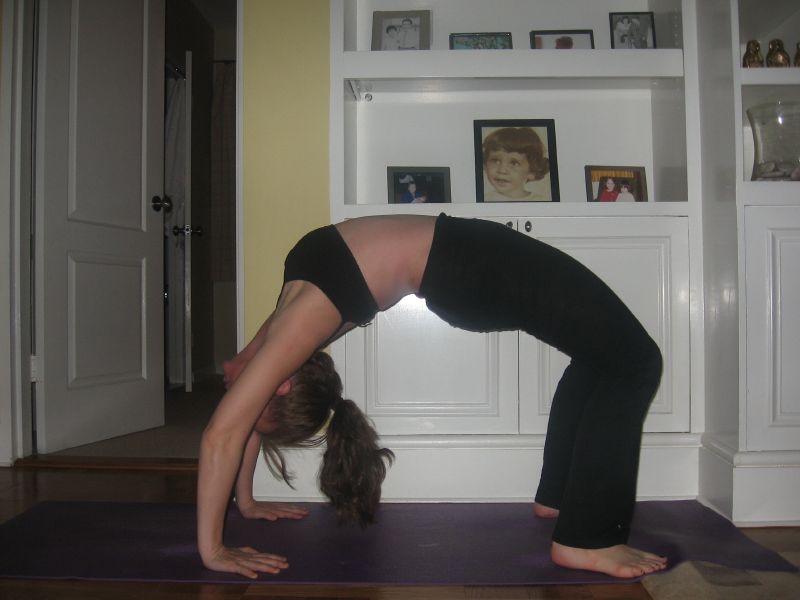Hips don't lie
 It's true what they say - hips don't lie. If you spend your day at a desk, if you walk everywhere because you live in a pedestrian-oriented city (as Julie pointed out to me), if you spend a lot of quality time with your bike or running or skating, your hips are going to rat you out. You'll feel it whether or not you practice yoga. But you'll especially feel it if you do practice yoga. And, of course, over time, yoga can help to free your hips.
It's true what they say - hips don't lie. If you spend your day at a desk, if you walk everywhere because you live in a pedestrian-oriented city (as Julie pointed out to me), if you spend a lot of quality time with your bike or running or skating, your hips are going to rat you out. You'll feel it whether or not you practice yoga. But you'll especially feel it if you do practice yoga. And, of course, over time, yoga can help to free your hips.
You know what else doesn't lie? History.
As I was happily practicing today in my sunroom/terrace/whatever the hell I am supposed to call it, it occurred to me that in my week's worth of home practices, I have made far more progress than I have been making in quite a long time in a week's worth of shala practices. This is perhaps most obvious in my physical practice. But it is also obvious in my breathing, my discipline, and the balance between tapas (passion for the practice) and non-attachment (not getting bogged down in the harder postures or weighed down by my difficulties with Supta K). I am far more meditative practicing at home, even with all of the distractions of home, even with the four corners of York Avenue and East 79th Street in full view outside my windows.
The thought felt like deja vu. Where and when had I felt this way before? And then I realized. I had felt this way in college, and to an even greater extent, in law school.
This is something I usually admit in a joking tone, but what I am about to tell you is the God's honest truth: I graduated from Tufts University with a 3.62 (out of 4) average, Magna Cum Laude (high honors), and inducted into Phi Beta Kappa (the most highly regarded national honor society of American undergraduate institutions) by the professors in my department (English...what a surprise)...and after my first, rather unremarkable year at Tufts, I only seldom attended class.
After my freshman year, I decided to honor my own instincts, which told me to learn as much as I could on my own, reading and studying the books on the syllabus, writing my own study guides and attending class only when it was necessary (for example, in a small seminar setting) or when I was actually interested in and motivated by what the teacher had to say. For the most part, especially when my professors were the authors of the texts that they had assigned to us, being in class not only was not stimulating for me, but was counterproductive: it left me with less time and energy to study on my own. Beginning my sophomore year, I never received less than the highest possible grade in any class.
When I got to NYU Law School, attendance was mandatory in the first year. I suffered through it and only hit my stride in my third year, when I felt free to be the architect of my own time. I know that if my mom reads this, she is going to have a conniption, but here goes: in my third year of law school, I took the final (and only) exam in Criminal Procedure without ever having attended the class. Not once. I did not even know what the teacher looked like. I did know that he had written the text book, which I read diligently and digested into my own set of outlined notes. I received an A on the exam and in the class. Note: I still have nightmares relating to this episode in my life. As well as it all turned out, it was crazy and risky, and it shows up in my dreams in some form or another whenever I am feeling anxious. Usually, it's a test I haven't studied for, or a class that I couldn't attend because I couldn't find the classroom, or a final exam for a class that I (incorrectly) thought I had dropped. Not showing up to class for an entire semester is not something I am proud of, regardless of the grade I got on the exam. It just is something that is part of my story.
And like I said, history doesn't lie. I tell my tale of high-priced higher-education truancy because it provides some insight into my shala truancy. It may seem perverse to some of my readers, particularly those who can only wish that they had access to the amazing teachers whose classes I am not attending these days, but this is the way that I learn best: with plenty of time to process things on my own. When left to my own devices with the seeds of knowledge provided by my teachers, whether college professors or Ashtanga teachers, I find myself blossoming, my creative juices flowing, my motivation soaring.
Of course, in Asthanga practice (just like in the school context), there are times when it is very important that I attend class on a regular basis. I have felt that need to be in class with my teacher. I felt it keenly when I was struggling with the Marichyasanas and to a lesser extent when I wanted to be taught (not just given, but taught Bujapidasana). I also felt it when Sir offered a course on Pranayama and Philosophy and when I had the opportunity to learn about yoga-practice-supportive eating at Yoga Shala Summer Camp.
I am sure that I will feel it again. Even today, even as I was luxuriating in the freedom of my self practice, I was already planning when I would return to the shala. A part of me wanted to come back tomorrow and Wednesday for Mark's last two days. But another part of me knew that I should continue with my self-practice and return to the shala in the fall, when I will be able to practice there with some consistency.
So, there you have it. There is, apparently, nothing new about my blowing off class. My own version of home schooling has been my chosen method of learning for as long as I had the right to choose my method of learning. It's not the shala. It's not the Ashtanga. It's me. It's the way I learn best: marinating in my own juices, so to speak.
YC








2 comments:
Conniption fit noted.
By the way, I, who attended all classes, have the same type of anxiety dreams.
Hips Don't Lie was a song and now you've made it a joke!
Post a Comment